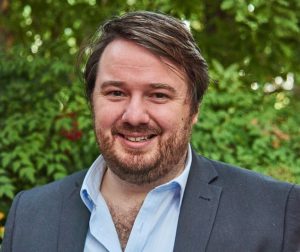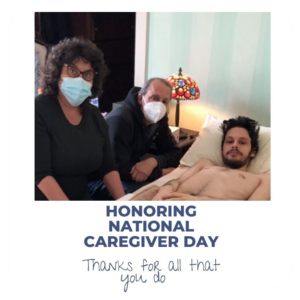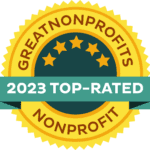
An Update from Chris Armstrong,
Director, Melbourne ME/CFS Collaboration
The Melbourne ME/CFS Collaboration is the fifth and newest OMF funded collaborative research center. After making the journey to Australia to set up the Collaborative Research Center (CRC), Director Chris Armstrong began the groundbreaking study that he hopes will improve the lives of ME/CFS patients of Australia — and beyond:
 Moving countries is stressful at the best of times, and these are not the best of times. It took three months traveling on an emotional rollercoaster of flight cancellations and availability to get from California to Australia. This would have been demoralizing in any other situation, but this year I could not help but feel lucky and thankful as we all were experiencing the same hardships and many others have it a lot worse.
With quarantine and moving behind me, I am pleased to share that my new team and I at the Open Medicine Foundation Collaborative Research Center in Australia are launching a Longitudinal Study of people with ME/CFS.
While we know people with ME/CFS often suffer the same or similar symptoms, we do not know if the same or similar underlying biological problems trigger the symptoms. By looking at the biological differences in individuals with ME/CFS at mild and severe moments of their disease, we can start to piece together what may be causing their illness and what circumstances improve or exacerbate their symptoms.
Longitudinal Study Overview
Participants with ME/CFS will be asked to:
Moving countries is stressful at the best of times, and these are not the best of times. It took three months traveling on an emotional rollercoaster of flight cancellations and availability to get from California to Australia. This would have been demoralizing in any other situation, but this year I could not help but feel lucky and thankful as we all were experiencing the same hardships and many others have it a lot worse.
With quarantine and moving behind me, I am pleased to share that my new team and I at the Open Medicine Foundation Collaborative Research Center in Australia are launching a Longitudinal Study of people with ME/CFS.
While we know people with ME/CFS often suffer the same or similar symptoms, we do not know if the same or similar underlying biological problems trigger the symptoms. By looking at the biological differences in individuals with ME/CFS at mild and severe moments of their disease, we can start to piece together what may be causing their illness and what circumstances improve or exacerbate their symptoms.
Longitudinal Study Overview
Participants with ME/CFS will be asked to:
- wear heart rate monitors
- fill in surveys
- provide finger-prick blood drops
- collect urine samples from themselves while at home.
Commemorating National Caregiver Day
A caregiver shares her touching story
 This past February 19 marked National Caregivers Day. Open Medicine Foundation would like to take a moment to acknowledge and thank all of the selfless caregivers who help to support their loved ones with ME/CFS and related complex, chronic illnesses.
This past February 19 marked National Caregivers Day. Open Medicine Foundation would like to take a moment to acknowledge and thank all of the selfless caregivers who help to support their loved ones with ME/CFS and related complex, chronic illnesses.
To acknowledge the resilience and strength of caregivers in our community, we are honored to share the story of a mother and caregiver to a son who is severely ill with ME/CFS:
“My name is Rebecca Groble and I am the mother of Gabriel Hull, who is severely ill with ME/CFS.
In the summer of 2018, he was on a fellowship in China and became very sick. Initially, the doctors thought he might have leukemia or another blood disease, but soon realized he had a severe case of mononucleosis. It was a scary time for us. We were back home, and he was across the globe. I was getting ready to go to China when he started stabilizing, and he told me not to come. He improved and was able to continue the fellowship. However, instead of traveling around China after the fellowship ended as he had planned, he came straight home to Illinois.
"Despite the pain and heartbreak, I still have found beauty in my relationship with Gabriel."
In February of 2020, Gabriel became a patient of an ME/CFS specialist, which has given us hope. It’s still a roller coaster ride where we see improvements, followed by crashes. Although the crashes are terrifying, the improvements make us feel optimistic. Gabriel can whisper now. He no longer wears headphones. He is still sound sensitive, but no longer needs earplugs. However, we need to keep the house quiet, and he cannot watch TV, listen to music, or text with his friends.
Our family has been through so many difficult changes. This situation has caused us to lose friends who don’t understand. Fortunately, other friends have stepped up and have been there for us. The kindness of the community has given us hope and strength.
Of course, it’s hard to see my son in this condition. He is a musician but can’t play his piano because he is bed-bound. He was an active college student and volunteer. He walked from one end of our town to the other instead of driving, biking, or taking public transit. But now, he’s reliant on us for all tasks such as toileting, eating, and brushing his teeth. If he wants a sip of water, he needs one of us because he can’t lift a glass.
Gabe has a few friends in town who still reach out. They have brought over cards and flowers, which reminds Gabriel he has not been forgotten. The Hillel community at the University of Chicago has been supportive of Gabe, too. One girl made him a bracelet, and another sent a stuffed animal. This is so important for Gabe to know that friends love him, care about him, and hope for his recovery.
Despite the pain and heartbreak, I still have found beauty in my relationship with Gabriel. We have short conversations where Gabriel will whisper to me, and I will write my response on a paper pad. Gabe has whispered to me a quote that he would like to share with the community:
“Because of post-exertional malaise (PEM), ME/ CFS makes you fear all the things which once made life good and beautiful. First school, then seeing friends, listening to music, bathing, even eating. Now I am afraid to even laugh. It could cause a crash and make me permanently worse.”
Gabriel is the driving force behind the fundraising that we are doing for OMF on Facebook. Gabe whispered to me he would like me to organize a fundraiser for his birthday to support OMF funded research into ME/CFS. Each donation puts a smile on his face. He did a Facebook fundraiser last year and raised around $4,800 for OMF. This year, I started a Facebook fundraiser on his behalf because he’s not capable. Our goal was $7,000, and we reached it in a week.”
We are so moved by the generosity of Gabriel’s family. ME/CFS is a devastating illness, with complex challenges that impact the lives of patients and family members alike. We appreciate all the caregivers who step up to meet these challenges with compassion and strength.
We invite caregivers and patients to visit our Resource Center webpage to find a variety of helpful information. Here, parents can also find useful information and resources to help their child with ME/CFS.
Thank you to caregivers for all you do to support the community, from your OMF family.
Check out our FAQ page!
OMF has created a new frequently asked questions (FAQ) page, available on our website!
Don’t see an answer to your question? Feel free to contact us: info@omf.ngo. We hope you find this to be a valuable resource!
Got an unwanted car?
You can help OMF this winter by donating any unwanted vehicles taking up space at your home. Cars, trucks, SUVs, boats, and even farm equipment can help us accelerate our work to end ME/CFS. Donating is easy, and the pick-up is free. To get started, visit careasy.org.

*Please note, this option is currently only available in the United States.
Share your story with us!
Your story is important. By sharing your experiences, we can increase awareness and understanding of what it is like to live with chronic, complex illnesses.
At OMF, we also understand the importance of community. Sharing your story starts meaningful conversations and connects you to others within our network of patients, advocates, and allies.
Submit your story today to info@omf.ngo*
*By submitting, you consent to letting Open Medicine Foundation use your story for our public social media platforms or website.
If you are able, please consider contributing to our effort to
uncover research-based answers.
Help us improve the quality of life for all sufferers of ME/CFS and other
chronic complex diseases, such as Post Treatment Lyme Disease Syndrome
and Fibromyalgia.


